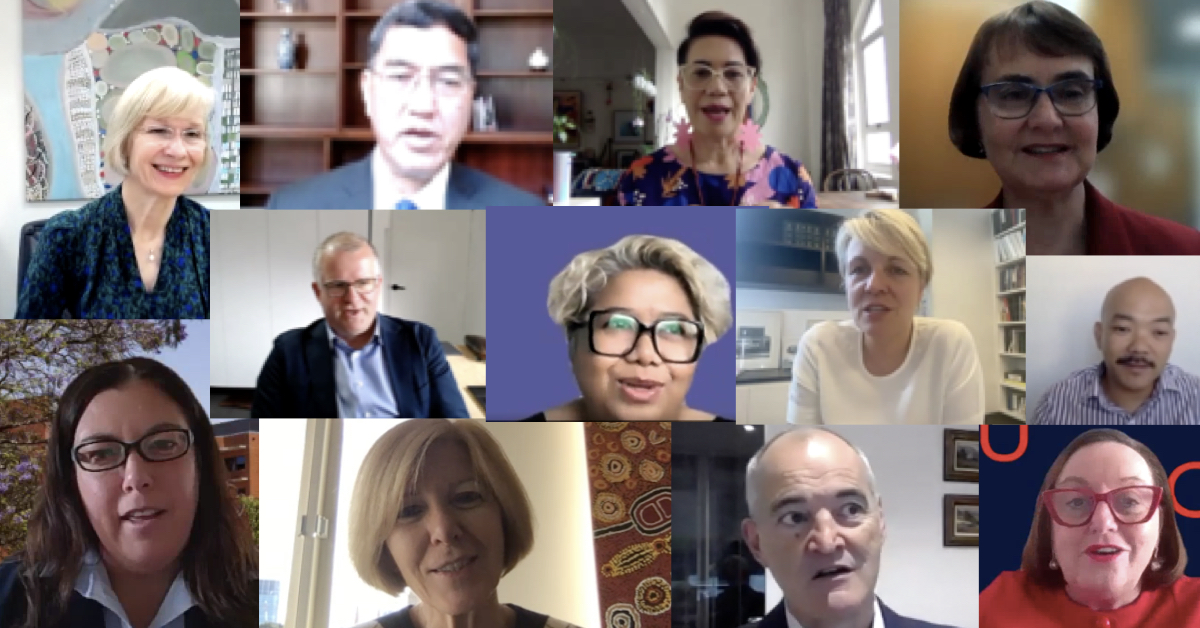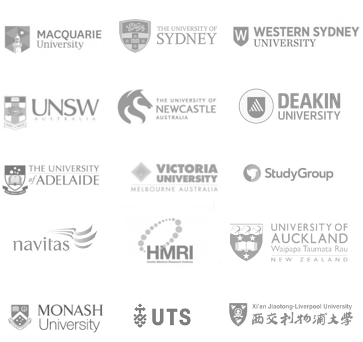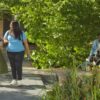From 2020 I have been talking with leaders about their responses to the pandemic. Our 2020 series had an unexpected reprise in 2021, as anticipation of a New Normal turned into ongoing need for resilience. Now we have entered in our third year of living with COVID-19, we reflect on what we have learned about leadership in a pandemic.
Thinking back to Shanghai, 2020
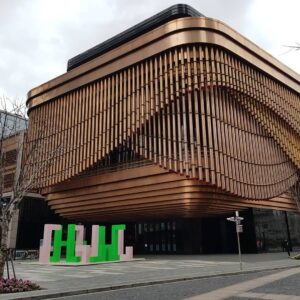
Fosun Foundation, Shanghai February 2020
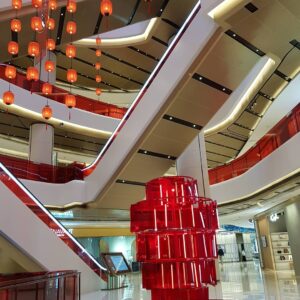 In Shanghai during the lunar new year 2020, I saw surreal scenes of one of the world’s most dynamic cities in a COVID-stasis. Returning on the last direct Qantas flight to Sydney, as the national borders closed in around us, it was clear that COVID would create shockwaves through not just the worldwide human biological network, but other networks too: global supply chains, and the vital talent flows and migration of students that are integral to the cyclic renewal in innovation and higher education.
In Shanghai during the lunar new year 2020, I saw surreal scenes of one of the world’s most dynamic cities in a COVID-stasis. Returning on the last direct Qantas flight to Sydney, as the national borders closed in around us, it was clear that COVID would create shockwaves through not just the worldwide human biological network, but other networks too: global supply chains, and the vital talent flows and migration of students that are integral to the cyclic renewal in innovation and higher education.
The world soon thereafter went into pandemic, and crisis control, and with my team I set out to collect, and share, insights from leaders to help us to see and plan a way ahead. Interviewing the senior management of universities, cultural and research institutions, in their homes, we crafted short but authentic messages out of their responses to the same three questions that we asked every single one of them.
2020 Interviews with Leaders about Navigating the New Normal
During the shock of 2020 lockdowns, our first question was always, ‘What keeps you going?’ A very basic question that connected our immediate lived experience. Our leaders spoke about being inspired by their communities, connecting with their teams, and time away from meetings to be with family and enjoy time outdoors. Instead of rushing to be physically present at countless meetings and engagements around the world, we had to embrace being stuck in one place.
Our second question asked our leaders what they had learned from the pandemic that might change the way they lead. They talked about trying new things, measured risks, daring to fail. Adapting to constraints forced innovation.
The final question we asked our leaders in 2020 was what leadership qualities would be most valuable to adapt to the new normal. The turmoil put a new frame on what was important in organisational leadership. Themes emerged about the creative and human sides to leadership: the best leaders were authentic, engaged, and able to see continuing purpose and a vision ahead, or be able to lead their communities on exploratory journeys, to co-create the future. As Rossie Ogilvie put it, leadership that “put colour and light back into what’s possible.” Leaders opened up to a shared journey to find answers, even to showing a vulnerability within leadership. A comment from Professor Pascale Quester that resonated with social media audiences: “we need leadership that doesn’t pretend to know the answer”.
Caring, authenticity, vision and inspiration, agility and responsiveness were frequently mentioned. The humanness of leadership was at the fore. Indeed, the way our speakers allowed us to see them in these clips was more real than many would have seen them before in their senior corporate roles.
2021: Resilience
Going back into lockdown in 2021, we decided to reprise our series, with just one fresh question. As a word nerd (my PhD is in literature) I couldn’t resist to ask our leaders to nominate a new collective noun for lockdowns. While light-hearted in approach, this elicited some dark, visceral responses that captured the collective mood. We heard suggestions of
-
a “reverberation” of lockdowns (Alec Cameron)
-
a “dreary” of lockdowns (Maryanne Dever)
-
a “crush” of lockdowns (Carolyn Evans)
-
a “recluse” of lockdowns (Paddy Nixon)
-
a “shock” of lockdowns (Debbie Terry)
-
an “avalanche” of lockdowns (Michelle Trudgett)
-
a “chain-gang” of lockdowns (Robyn Ward)
Trish Davidson captured a collective, hopeful view of the repeated lockdowns when she said, “none of us will be okay until we are all okay”.
The year 2021 may end up being a forgotten year. When we expected to be moving on from 2020 to a ‘New Normal’, instead we felt caught in a repeat. In speaking with our leaders, the focus had shifted. Instead of looking to the horizon, there was more resignation to ongoing adaptation, and what we had to get through, and reflection on what had been valuable to the journey with the pandemic. The role of science, of universities for serving communities and sharing creativity and world-changing research all featured. Leaders championed the efforts of individuals on campus, of student groups and the collective will of staff to engage in new ways and still come together and get things done. What persisted from 2020 was a leadership imbued with human themes: kindness, a basis in human contact.
We started out in 2020 calling our interview series “Navigating the New Normal”, then in 2021 our second set was named “Resilience”. Now in January 2022 we are not sure when we will be through this pandemic, but what’s clear is that we are all in it together like never before, and things will never be the same again.
Credits
Thanks and credit go to our participating leaders who shared their vision, feelings and in many cases, homes with us online
Leadership under lockdown – Resilience Series 2021
- Ima (Rahimah) Abdulrahim, Director of Public Policy for Southeast Asia at Meta ( Facebook )
- Dr Handa Abidin, Vice Rector, President University
- Professor Alec Cameron Vice-Chancellor at Aston University (now Vice-Chancellor at RMIT University)
- Professor Patricia Davidson Vice-Chancellor at University of Wollongong
- Professor Maryanne Dever, PVC Education and Digital at ANU
- Professor Carolyn Evans, Vice-Chancellor at Griffith University
- Dr. Yohannes Kurniawan, Dean, School of Information Systems BINUS University
- Professor Widjaja Martokusumo, University Secretary, Institut Teknologi Bandung
- Dr Wawan Mas’udi, Dean Social and Political Sciences, Universitas Gadjah Mada (UGM)
- Dyan Shinto E. Nugroho, Chief Policy & Government Relations, Gojek
- Professor Paddy Nixon Vice-Chancellor at University of Canberra
- Professor Yudi Samyudia, Dean, School of Applied Sciences Universitas Prasetiya Mulya
- Professor Adam Shoemaker, Vice-Chancellor at Victoria University
- Professor Deborah Terry at Vice-Chancellor and President at University of Queensland
- Professor Michelle Trudgett, Deputy Vice-Chancellor, Indigenous Leadership at Western Sydney University
- Professor Robyn Ward, Executive Dean, Faculty of Medicine and Health at University of Sydney
Navigating the New Normal Leadership Series 2020
- Kerrie Campbell, CIO at Flinders University
- Professor Amit Chakma, Vice-Chancellor at University of Western Australia
- Kylie Colvin, Director of Strategy, Development and Delivery at University of Nottingham Malaysia
- Professor Patricia Davidson, Dean of Nursing at Johns Hopkins University
- Professor John Fischetti, PVC Education & Arts at University of Newcastle
- Dr Kevin House, Director of the Institute for Learning and Research, Dulwich College International
- Professor Denise Kirkpatrick, Senior Deputy Vice-Chancellor at Western Sydney University (now President at Nan Tien Institute)
- Vanessa Lemm, Vice President and Executive Dean of College of Humanities, Arts and Social Sciences (now Executive Dean, Faculty of Arts and Education at Deakin University)
- Professor Iain Martin, Vice Chancellor at Deakin University
- Rosalind Ogilvie, Vice-Principal (Advancement) at University of Sydney
- Professor Susan Page, Associate Dean (Indigenous) at University of Technology Sydney
- The Hon Tanya Plibersek MP, Education Shadow Minister and the Federal Member for Sydney in the Australian Federal Government
- Professor Pascale Quester, Vice Chancellor at Swinburne University
- Aaron Seeto, Director at Museum MACAN, Jakarta
- Kim Tairi, Kaitoha Puka | University Librarian, Auckland University of Technology
- Todd Walker, Provost at University of New England (now Vice Chancellor at University of the Highlands and Islands)
- Dr Christie White, Executive Director, Student Success and Wellbeing at University of Southern Queensland
- Alex Zelinsky, Vice-Chancellor at University of Newcastle
De Sailly team credits
Special kudos to Monica Trezise, who has brought this series to life in social media through concept, production, editing, and posting, and to Dr Santi Dharmaputra who brought in people of influence from her network in South East Asia, including from higher education, government and industry.

